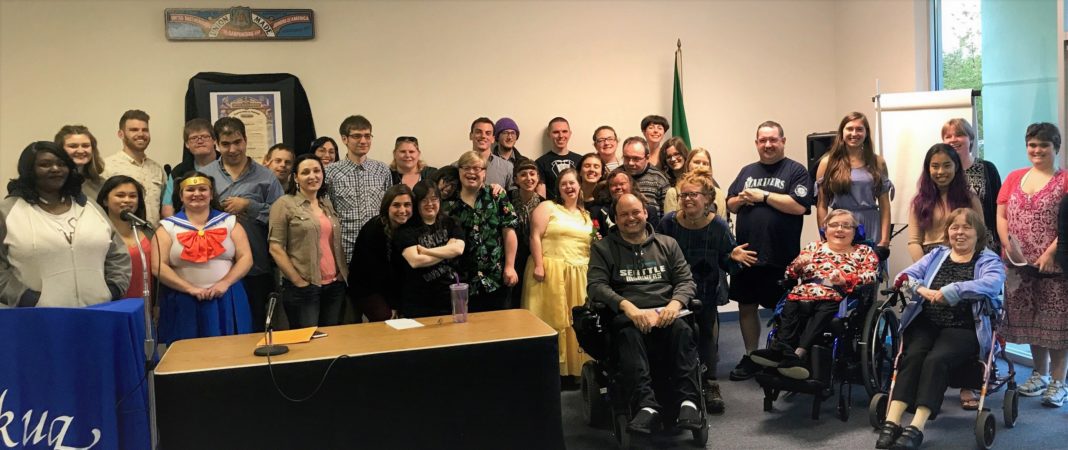If you talk to Ellen Shortt Sanchez, the first thing you will notice is that she doesn’t say “I” very often. When she tells you about work she does with the Center for Community-Based Learning and Action (CCBLA) at The Evergreen State College, she always says “we.” Ellen is the director for the CCBLA and she is passionate about the many benefits the CCBLA provides, not to any one group or individual, but to entire networks throughout our community.
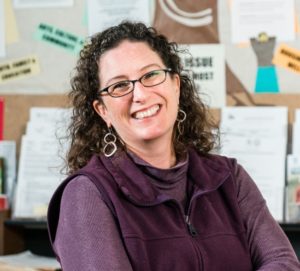
In 2004, the CCBLA, began as the result of the efforts of a number of faculty, including Ellen, and Jacinta McKoy, who Ellen credits as the CCBLA’s mentor. Tragically, Jacinta passed away unexpectedly that very year, but her legacy lives on through all the CCBLA does. Community based learning is a type of service learning where students engage with their community and contribute to the needs of the local area. This type of learning builds real-world skills beyond the classroom and facilitates engagement with the general public to support local needs while receiving direction from staff and faculty. The CCBLA offers a number of programs, each with an opportunity for Evergreen students to learn and give back.
Gateways for Incarcerated Youth
The Gateways for Incarcerated program has been helping to break the cycle of incarceration and recidivism for 22 years. The program matches Evergreen students with youth who are incarcerated in Green Hill School, a juvenile detention facility in Chehalis. The Evergreen students meet at the facility and are paired with an incarcerated youth to find out what subject they are interested in learning. Then, the Evergreen student develops a curriculum and teaches the youth about that subject.
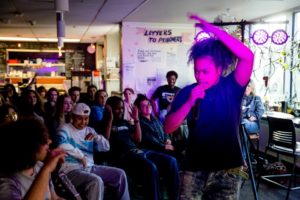
With as many as 98 percent of all incarcerated youth being released and return to the community, the Gateways program is a way for the youth to stay connected and gain education and credits, which motivates them to continue on the right path once they are released. For some, the credits are merely symbolic, an example to themselves and others that they can succeed in something that challenged them before. For others, like Gateways for Incarcerated Youth Alum, Terrance Turner, the program was just the beginning of his journey towards self-improvement and a better future.
Additionally, the Gateways program offers the Academic Mentorship Program, in which Evergreen students and anyone from the community can help mentor an incarcerated youth. That program takes place in the Green Hill School and in Thurston County at the Touchstone Community Home and Thurston County Juvenile Detention Center.
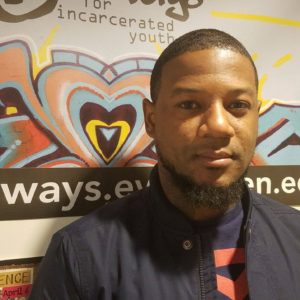
Photo credit: Ellen Shortt Sanchez
“One of the most valuable resources Gateways provides are the relationships that form between the youth and the Evergreen students,” says Talib Williams, Gateways program coordinator.
Student Oriented Studies
Many Evergreen students participate in Student Oriented Studies (SOS) where they take part in internships with organizations around the community. Then they come together with classmates and faculty to share and discuss what they have learned.
One organization that Evergreen students have helped with is TOGETHER!, an afterschool program in partnership with the Tumwater School District. Kaira Gomez brought her skills and experiences to the TOGETHER! program. “She enhanced our outreach to the Spanish speaking communities in the Lacey and Tumwater school districts,” explains Michael Dennis, community schools manager and Kaira’s site supervisor. Kaira was able lay the foundation for future program expansion and provide a positive impact to her community. “Kaira is a passionate educator who enriched the lives of all the students she interacted with during her internship,” he adds.
Community Service Work Study
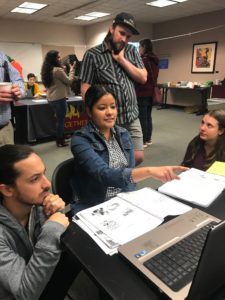
The CCBLA promotes the Community Service Work Study as a way for students to learn and pay for college at the same time. Students volunteer with different organizations throughout the community and receive payment though their work-study program. “Students are not getting in debt,” Ellen says, “They are earning their financial aid.” For this program, the CCBLA collaborates with the student employment office. There are many organizations that benefit from community service work study, one of those is Literacy and Education for Adults with Disabilities (LEAD).
Literacy and Education for Adults with Disabilities
LEAD is a program developed by the non-profit Kokua that pairs adults with disabilities with college student tutors from area colleges in an opportunity for continuing education and enrichment. “Evergreen is a natural fit for LEAD,” says Randi Miller, community programs coordinator for Kokua. Students at Evergreen join the LEAD Beyond Club and commit three quarters. The program is supported by the CCBLA and receives additional faculty support over the winter quarter by Dr. Chico Herbison with his class Student-Originated Studies: Culture, Community, and Disability.
The adult learners lead the pair, telling the tutor what they want to learn – whether that is sign language, knitting, or writing – the Evergreen student tutor helps facilitate that. “Everyone learns with this program,” Randi says. “Sometimes they learn different things and sometimes they learn the same thing.” Students at Evergreen have responded positively to the LEAD program. “The first year we had 5 learning pairs, and this year we have 2,” she adds. One such pair is Dylan Kuehl and Spencer Gehner, who have gotten a lot out of their time together.
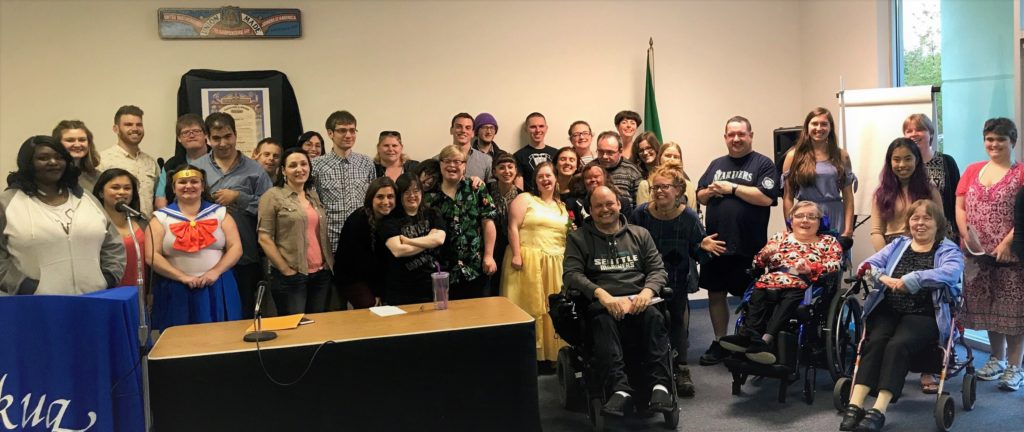
Ellen stresses that much of the work that happens through the Center for CCBLA is a result of dedicated and passionate students. The CCBLA connects the students with the many organizations who need volunteers. The CCBLA is also able to provide stable relationships with the organizations, as the time that students spend at Evergreen is limited. The CCBLA ensures that the partnerships built by the students continue long after the students leave, so that others may experience the benefits that community based learning has to offer.
To learn more, visit the Center for Community-Based Learning and Action website.
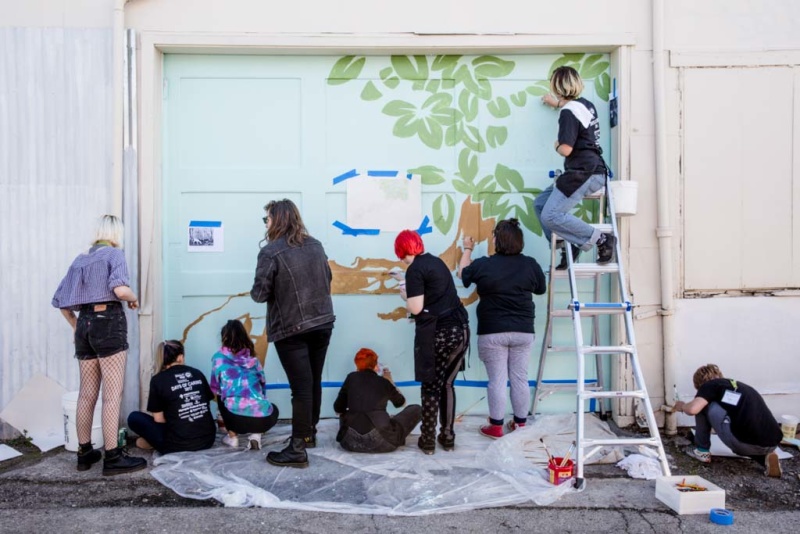
Sponsored







































